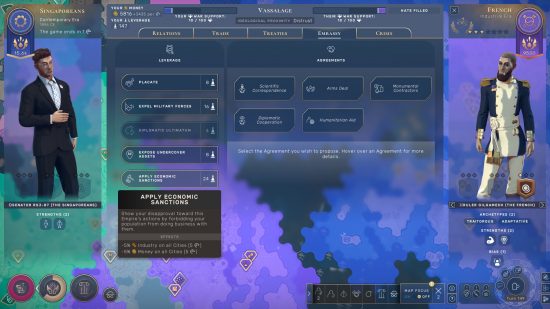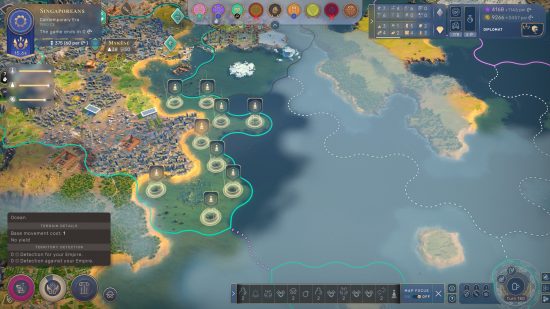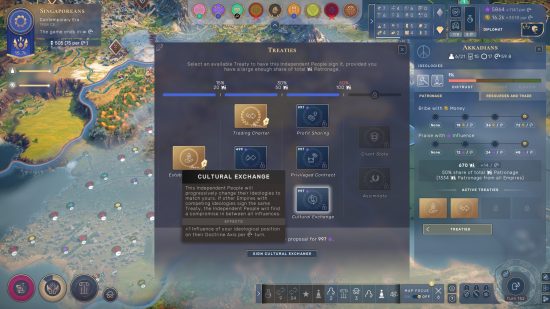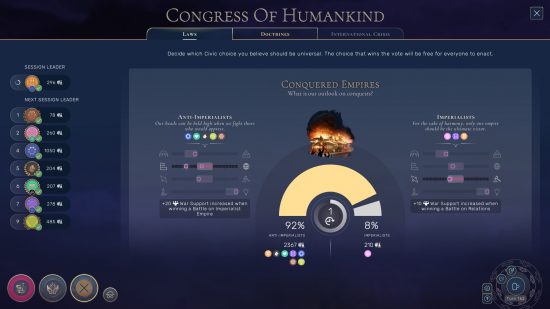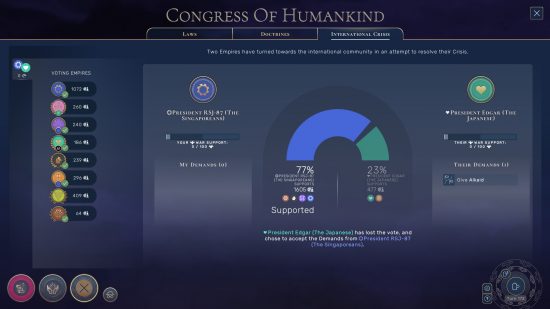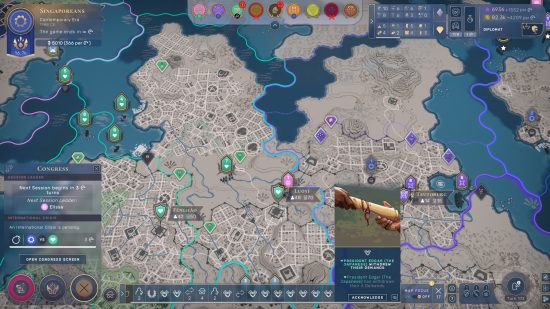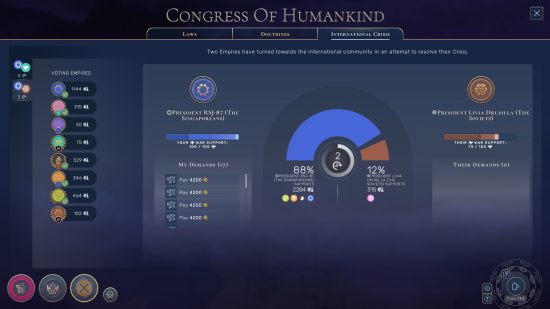In last year’s Humankind review, I said that it hadn’t reached its final form yet. It’s a pretty typical sentiment in the age of digital gaming: according to our review, even the latest Call of Duty is a bit skeletal, and the good news is that after our Humankind Together We Rule review, the Amplitude 4X game that poisons civilization feels reassuring. . heavy. And yet, as much as I missed the new mechanics when they disappeared, their presence didn’t make much of a difference to my games.
In addition to the classical era’s brazen flirtation with the Achaemenid Persians, I played one of the new diplomatic cultures of each era. I kept a close eye on the Lever Caches map, the new currency for diplomatic stratagems. I tried to use the Humanity Congress for interesting things. Basically everything works and gives the comforting feel of a fuller humanity sim, though the religion mechanics are still very underdeveloped, but you can play it how you want. Other that diplomatic is more coherent, controlled and satisfactory.
Lever nodes appear on the map where rival empires have clashed. Gathering levers like killing enemy units or researching technologies can earn you era stars, and diplomatic crops earn more renown (currency for humanity points). They can also use influence with any type of unit, while other cultures will need to use new Emissaries that can cross borders without penalty.
It is a great investment to establish a leverage effect. It’s not that common and tends to happen far from your own borders, meaning that even in a diplomatic culture you relied on envoys to collect them, on those occasions when you had military units in the territory of a neighbor you loved and one would expect a lot beyond diplomacy. I also found that the AI attacked my envoys without much remorse, even when we weren’t at war. The rejection of discontent is a much better source of pressure, although it depends on the dissatisfactions that arise. For all these reasons, there will be many more later in the game.
It’s not like you can do much with the leverage until you build an Embassy, a unique new neighborhood that’s available early but is a worthwhile investment until you have some kind of industry. I built mine in the classic era and initially only had two interactions available. “Appeasement” may deplete the adversary’s military support, but it is only useful in preventing conflict, since it does not solve any problems that such grievances may cause.
Two players, each with an Embassy, have access to a new set of potential deals that require good connections to sign but are quite powerful. Sign a weapon contract to gain access to your partner’s token unit; agree on diplomatic cooperation to gain 50% of each other’s influence from new information; or contribute to the creation of their wonders in exchange for a great reward in the form of leverage, influence or money.
It’s a great new set of toys, but to say that they combine into a specific playstyle or a wide range of strategies is an exaggeration of their impact. They are situational and tactical tools, for example, to prevent a war, to start it under more favorable conditions, or to support your efforts in other areas.
The Congress of Humanity is more interesting because of the crisis system. When you make a claim against another empire, you can submit it to Congress for arbitration, and the loser of the vote will be forced to accept the decision of the international community or declare an unauthorized war. The AI is sometimes still willing to do this, so an exciting and historically authentic international tightrope game emerges: how many requests should I make based on its personality and balance of power? And in cases where I want or even seek to provoke a war, I’m happy to make minor claims, from denying treaties to disrupting trade to enacting civil rights, against anyone I don’t like, and see how . the world gangs up on them and they go bankrupt because they pay me tens of thousands in fines.
This is what I expected to see more; it is a kind of diplomatic game that the World Congress of Civilizations should have included but never did. You can be sure that the vote will go in your favor if you have developed your international friendships and influence, a sort of global aggregation of your influence, and this can give diplomatic players some teeth. You can further strengthen your influence by interacting with freelancers who have been reworked in a free update that will appear with the Together We Rule expansion. Confidence in the predominance of the votes is an effective and pleasant incentive to undertake this task, to become a “benevolent” patron of the small powers of the world. The rest of the Congress agenda is just as varied, with mechanisms to enforce international law, but it’s harder to manipulate in your favor and ultimately didn’t have much of an impact on my games.
In short, we reign together. Somehow it feels big and light at the same time – a 4X game of human history wouldn’t be or feel complete without stronger diplomacy – and yet most of the features in this expansion don’t make much of a difference to me. no plans at all or I was just pretty late, although in all honesty the same can be said for complex diplomacy in real history.
The crisis system is a big exception to this rule, but I’d feel better if more of the expansion’s features had the same impact, or populated the religion as well; clearly there is potential. it gains age stars for faith and adds a kind of religious culture, and without them humanity still lacks a satisfactory model for another important aspect of its theme.
Check out our Humankind review for our verdict on the base game, as well as our list of the best strategy games for other great games like it. Humanity: Together We Rule is out tomorrow for $19.99.
Humanity: together we rule the review
New features mimic an important aspect of humanity and help make humanity feel more complete, but they rarely have the impact you’d expect from a first major expansion to a 4X game.
Source : PC Gamesn


